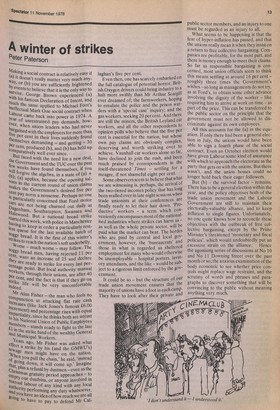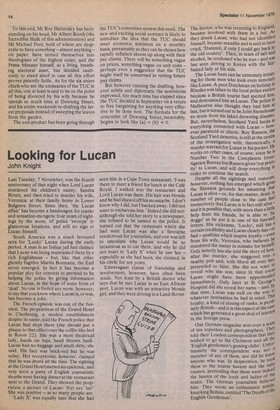A winter of strikes
Peter Paterson
Making a social contract is relatively easy if (a) it doesn't really matter very much anyWay, or (b) you are sufficiently frightened by events to believe that it is the only way to survive. George Brown experienced (a) With his famous Declaration of Intent, and much the same applied to Michael Foot's ineffectual Mark One social contract when Labour came back into power in 1974. A Year of unrestrained pay demands, however, when union leaders who had never bargained with the employers for more than five per cent in their lives suddenly found themselves demanding and getting 30 Per cent, produced (b), and (b) has held up comparatively well ever since. But faced with the need for a new deal, the government and the TUC over the past few weeks have found themselves, if you Will forgive the algebra, in a state of (a) ÷ (b); (a) applies, because the opening salvoes in the current round of union claims Makes the Government's desired five per cent , Pay norm a nonsense. Perhaps no one is Particularly concerned that Ford motor cars are not being churned out daily at Dagenham, Southampton, Swansea and Halewood. But a national bread strike started this week, with police in Manchester ,naving to keep in order a particularly restless queue for the last available batch of soggy bread. It is the first of this winter's strikes to reach the nation's soft underbellY Worse -.much worse may follow. The st)ggy bread men, having rejected 11 Per cent, want an increase of 25 and declare they are ready to strike for every last percentage point. But local authority manual Workers, through their unions, are after 40 Per cent, and the fact is that if they go on strike life will be very uncomfortable indeed Mr Man Fisher the man who feels no e. nmPunction at attacking flat rate increases cash (like Jack Jones's famous f6.00 Increment) and percentage rises with equal imPartiality, since he thinks both are unjust to his National Union of Public Employees Tern herslast stands ready to fight to the stands ready to fight to the in the strike fund of the wealthy General and Municipal Workers. Years ago, Mr Fisher was asked what effect a strike by his (and the GMWt-rs) 'When men might have on the nation. W ben You pull the chain,' he said, 'instead Of going down, it will come up.' Imagine that, plus a refusal by dustmen -even as the nristmas gratuity period approaches to `niPty our dustbins, or anyone involved in Manual labour of any kind with authority performing any du any local and You have an idea of how much uwchhwates°ever, are all gQing to have to pay to defend Mr Cal laghan's five per cent. Even then, one has scarcely embarked on the full catalogue of potential horror. Brit ish Oxygen drivers could bring industry to a halt more swiftly than Mr Arthur Scargill ever dreamed of; the farmworkers, hoping to emulate the police and the prison warders with a 'special case' inquiry; and the gas workers, seeking 20 per cent. And there are still the miners, the British Leyland car workers, and all the other respondents to opinion polls who believe that the five per cent is essential for the nation, but whose own pay claims are obviously complex, deserving and worth striking over to achieve. Vauxhall car workers alone so far, have declined to join the rush, and been much praised by correspondents in the itself-threatened Times settling for a meagre, if not shameful eight per cent. Some observers seem to believe that what we are witnessing is, perhaps, the arrival of the two-tiered incomes policy that has long been mulled over in late night sessions when trade unionists at their conferences are finally ready to let their hair down. 'Productive' workers a term which conveniently encompasses most of the nationalised industries where strikes can harm Us as well as the whole private sector, will be paid what the market can bear. The hordes who are paid by central and local government, however, the 'bureaucrats' and those in what is regarded as sheltered employment for many who would otherwise be unemployable hospital porters, lavatory attendants, and the like would be subject to a rigorous limit enforced by the government. It could be so but the structure of our trade union movement ensures that the majority of unions have a foot in each camp. They have to look after their private and public sector members, and an injury to one must be regarded as an injury to all.
What seems to be happening is that the fear of hyper-inflation has passed, and that the unions really mean it when they insist on a return to free collective bargaining. Companies are profitable, for the most part, and there is money enough to meet their claims. So far as responsible bargaining is concerned, most union officials seem to think this means settling at around 16 per cent roughly three times the Government's wishes so long as managements do not try, as at Ford's, to obtain some other advance involving the dignity of the worker like requiring him to arrive at work on time as part of the price. This can be transferred to the public sector on the principle that the government must not be allowed to discriminate against its own employees.
All this accounts for the (a) in the equation. If only there had been a general election in July, the unions would have been able to sign a fourth phase of the social contract. Even an October election would have given Labour some kind of assurance with which to approach the electorate as the party that gets on with the unions. But there wasn't, and the union bosses could no longer hold back their eager followers.
But (b) the survival factor remains. There has to be a general election within the year, and the policy objectives both of the trade union movement and the Labour Government are still to maintain their electorally-valuable alliance, and to keep inflation to single figures. Unfortunately, no one quite knows how to reconcile these objectives with the outbreak of free collective bargaining, except by the Prime Minister's threatened 'monetary and fiscal policies', which would undoubtedly put an excessive strain on the alliance. Hence the agonising series of discussions at No 10 and No 11 Downing Street over the past month or so; the anxious examination of the body economic to see whether price controls might replace wage restraint, and the scrutiny of words and phrases and paragraphs to discover something that will be convincing to the public without meaning anything very much. To this end, Mr Roy Hattersley has been standing on his head, Mr Albert Booth (the Incredible Hulk of this administration) and Mr Michael Foot, both of whom are desperate to have something -almost anything on paper, have turned themselves into theologians of the highest order, and the Prime Minister himself, as a living, breathing electoral asset, has decided cautiously to stand aloof in case all this effort proves patently futile. As for the six union chiefs who are the emissaries of the TUC in all this, one at least is said to be on the point of being divorced by his wife because he spends so much time at Downing Street, and his entire weekends re-drafting the latest proposals instead of sweeping the leaves from the garden.
The end-product has been going through the TUC's committee system this week. The new and exciting social contract is likely to introduce the idea that the TUC should meet economic ministers on a monthly basis, presumably so they can be shown how rapidly inflation shoots up along with their pay claims. There will be something vague on prices, something vague on unit costs perhaps even a suggestion that the TUC might itself be concerned in vetting future pay claims. But however cunning the drafting, however subtle and diplomatic the sentiments expressed, too much time has elapsed since the TUC decided in September on a return to free bargaining for anything very effective to be done now. The formula for the concordat of Downing Street, inexorably, begins to look like (a) + (b) = 0.



































 Previous page
Previous page